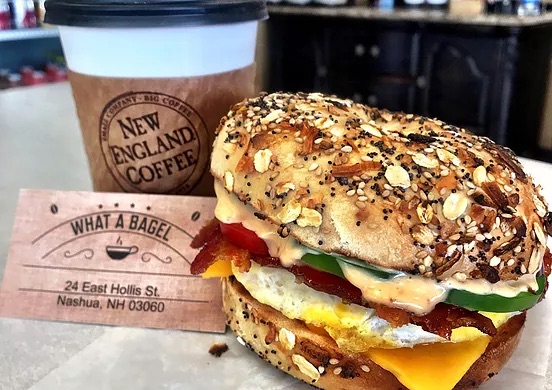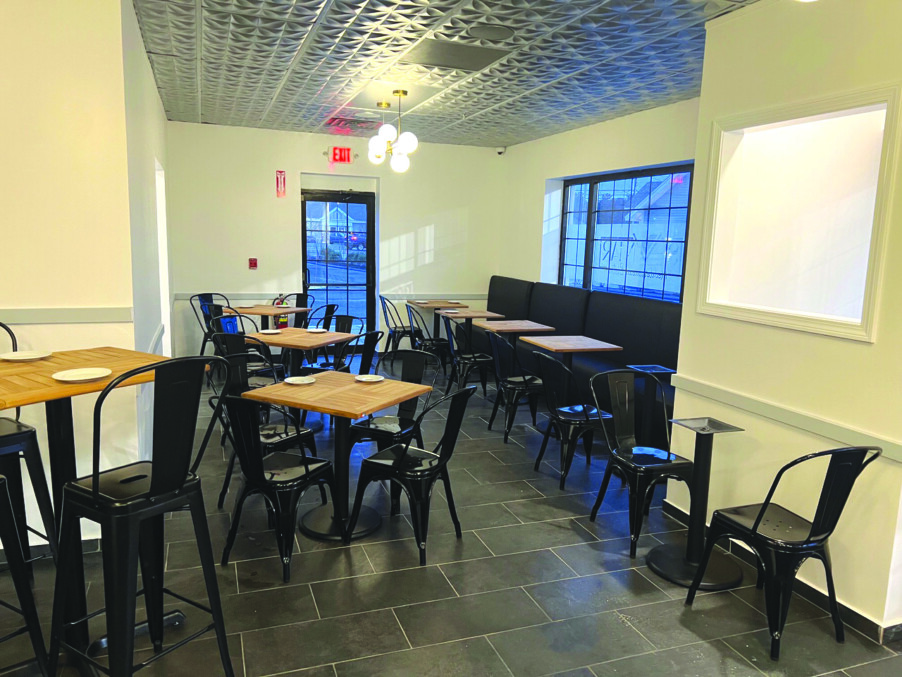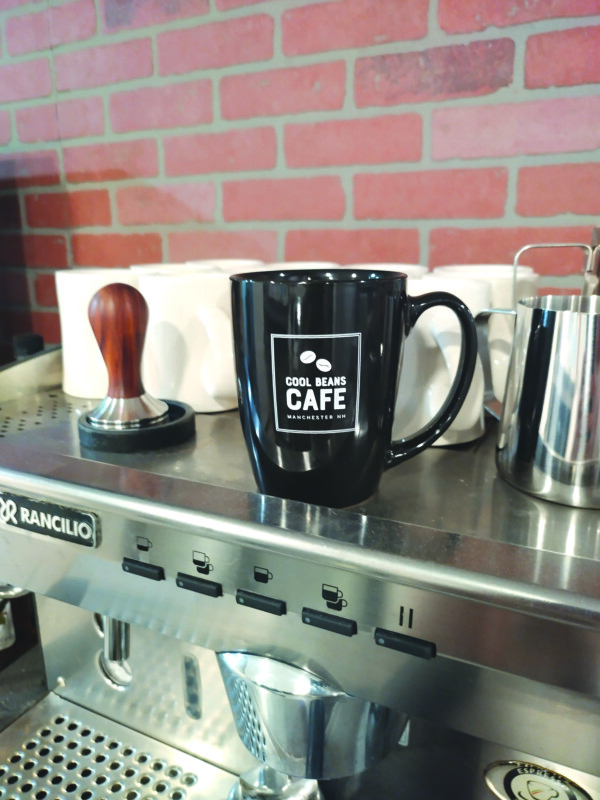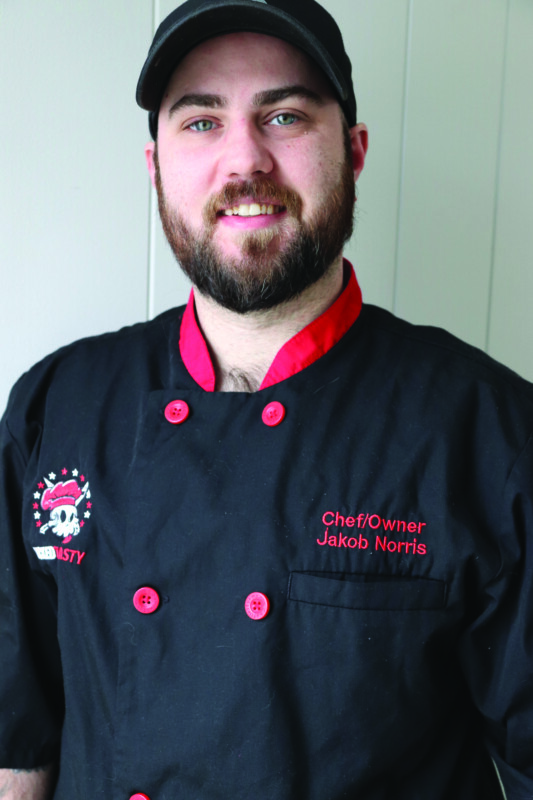New York style versus Montreal, everything versus asiago, and all the other variations that go into the perfect bagel
Remzi Kahya was only about 10 years old when, in 1996, his father, Ismail, opened Bagel Cafe on Hanover Street in Manchester.
Ismail had moved to the United States from Turkey several years earlier. Through a referral from a family friend, he got a job in New York making bagels. It was in Long Island, Kahya said, where his dad learned the ins and outs of the bagel business from a Jewish family who at the time had a small chain of shops in the New York area.
The knowledge and experience he gathered there would be passed down to his son — but, as Kahya recalls, not right away.
“I watched him. He didn’t let me make anything for a long time. I think it was probably like high school [when] I got to play around with the dough,” Kahya said. “I’ve been pretty much in that store ever since. … I went off to college, did other stuff, but I’ve been making bagels with dad pretty much since then.”
Throughout his college career, Kahya said, he never ruled out the possibility of continuing to work in the family business. In 2011 he opened a second Bagel Cafe on Second Street in the Queen City, eventually moving that to its current spot in Bedford in 2013. By September 2021 they had a third shop, this time in Nashua, called Simit Cafe (named for the Turkish word for a bagel-like bread). This all as the original Bagel Cafe continues its run of more than 25 years.
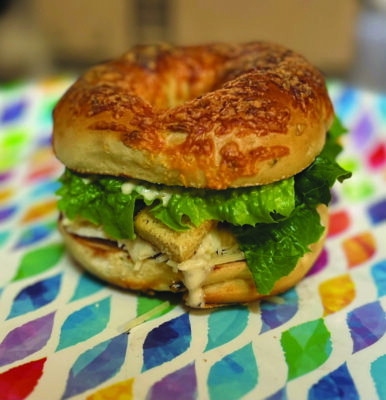
At around 3,000 square feet, Simit Cafe was the largest of the three storefronts, and this had originally inspired Kahya to introduce more of a full-service cafe concept with additional items. But because the bagels and bagel sandwiches have been far and away the most popular, he said the decision was recently made to rebrand the business as a third Bagel Cafe.
For many local bagel businesses like the Kahyas’, most roads lead back to New York or New Jersey. Take Bob Weygant of Rolleyholers in Exeter as another example — a home baker since his mother taught him at the age of 6, he would move to New Hampshire from New Jersey in the mid-2000s.
“When I moved up here, I missed bagels desperately,” Weygant said. “We used to go back and forth to New Jersey, bring up bagels … and freeze them. … And I got to the point when I said, ‘You know what, I’m going to learn how to make bagels. I know it’s a tremendous process, but hey, let’s go for it.’”
Weygant started selling his own home-baked bagels as a hobby in 2016 before making the transition to a commercial kitchen a few years later. By late December 2020 he would quit his day job with the goal of opening his own brick-and-mortar spot in the new year. Rolleyholers indeed arrived the following June.
Sheryl Tedford of Northfield — who grew up in Bergen County, New Jersey, just outside of New York City — also recalls frequently traveling south for bagels.
“We’d go down to New York and New Jersey, come back with like three dozen bagels and put them in the freezer,” said Tedford, who started Bagels From NH as a “pandemic business” in 2020 following her retirement. “We didn’t like any of the bagels you could buy in bags because they just weren’t what we were used to.”
On a whim, Tedford decided to try her hand at making her own and was pleased at how well they came out. She started selling them, eventually becoming a staple at local summer farmers markets in communities like Canterbury and Franklin. Next, she’ll be in Danbury on Feb. 4.
Styles and preferences
Brett Fleckner recalls a proposal made by his stepfather, Robert Frank, who had an established background in the restaurant business.
“He thought we should do either pasta or bagels, and I just went along for the ride,” said Fleckner, whose family has owned and operated Bagel Alley in Nashua since 1989. “He felt that those were two things that would always continue. And, I mean, he was right. Bagels worked.”
More than three decades later, Bagel Alley has become something of an institution in the Gate City, known for its enormous bagels, thicker than your fist and made fresh every morning.
“I get up at 3:30 [a.m.] every day and I come in by 4:30, and if it’s not me it’s my nephew Zachary, and then my sister is here six, seven days a week,” Fleckner said. “That’s what it takes. There’s no shortcuts.”
Bagel Alley has several wholesale accounts in southern New Hampshire and northern Massachusetts. Less than a mile away is What A Bagel, another shop known for making its own bagels fresh every morning, in addition to made-to-order bagel sandwiches.
“Almost all of my bagels are what you would call New York-style,” said owner Chris Weier, a Marine Corps veteran and Nashua native who took over the shop in 2019. “They are all hand-rolled, boiled bagels. … A traditional New York-style bagel is going to be very dense and very chewy.”
At Bagel Cafe, Kahya said, his are more of a take on the traditional New York style.
“We like to steam our bagels,” he said. “We do a lot of sandwiches and I just think, personally, [steaming] the bagel makes it better for making a sandwich. You still have the crust that you want, but it’s not too hard. … I think it’s better than a New York bagel.”
At Rolleyholers, Weygant said he considers his bagels to be akin to New York or New Jersey styles.
“From my definition, a New York style is slightly larger. They have a tougher crust on the outside. … The New Jersey style is going to be a little softer on the outside … and they are slightly smaller at about four and a half ounces,” Weygant said. “But I mean, it really kind of comes down to your recipe and methods. … We’re kettle boiling and using a specific set of ingredients … [and] the amount of time that the bagel is spent in the kettle, the amount of time that they spend in the oven, the temperature at which they’re baking — all of that is going to play a part in what the real result is.”
What A Bagel also offers a few flavors of what Weier referred to as Montreal-style bagels. “Those bagels involve eggs,” he said. “So once you bring eggs into any baking process, you end up with a much softer, fluffier product. Easy to chew, if you think of, say, a brioche bread.”
Kahya said Montreal-style bagels are also traditionally known for being baked with honey-sweetened water in a wood-fired oven.
“I’ve eaten them in Montreal, but I like the New York style and the ones we do better,” he said, adding that the terms can be subjective.
Rolling in the dough
Bagels start with a flour- and water-based dough mixture that must be proofed, or left to rest, over a period of time, just like any yeasted bread.
“One of the significant factors of what makes a bagel a bagel is the hydration of the dough,” Weier said. “The amount of water that’s in the dough is lower than any other bread product that exists.”
Doughs for Weier’s bagels are hand-rolled anywhere from a day or two to a week ahead of time, depending on the batch, before they’re allowed to proof in the cooler.
“When you see those little air pockets inside the bread, that’s what the yeast is doing, is it will rise,” he said. “The longer you can get away with proofing it, the better. We try to stretch it out as many days as possible, because the longer it proofs, the more flavor comes out in the bagel.”
After the dough has finished proofing is where you’ll see bagels either boiled or steamed, depending on where you go. Sometimes they’re formed into their ring shape by hand from a long, thin piece of the dough, or other times a bagel machine will perform that function.
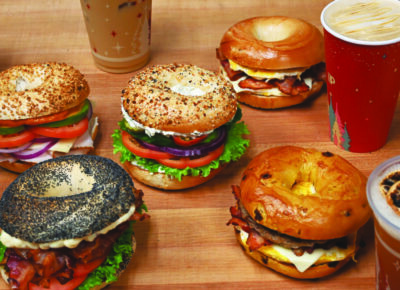
“At all three of our locations, we have a bagel machine, a mixer and bakers there, so we’re making them at all three,” Kahya said. “We usually do [them] in 50 pound and 100 pound flour batches. The machine has … a former and a divider. So the divider takes slabs of dough and cuts them into perfect amounts, and then it goes through a former and it comes out like a perfect circle.”
Kahya noted that, when it comes to flavors, all of the seeded options can be created starting with a plain bagel dough. The more intricate bagel flavors — think jalapeno cheddar, spinach or French toast — have additional ingredients in the dough and thus must be done in separate batches.
Some bagels at Rolleyholers start with a dough that’s formed by hand, while others use the bagel machine, which Weygant affectionately refers to as “Steve.”
“He’s got to have a name, because he’s our No. 1 employee of the month every year,” Weygant joked. “We did 84,000 bagels last year, all because of him.”
Through extensive practice and trial-and-error, Weygant said he eventually found a “sweet spot” in the water temperature when it comes to kettle-boiling his bagels.
“What you put in that kettle and the temperature of the water … is everything to the final product. If it’s too high or you put it in for too long, you’re going to get garbage,” he said. “We also differentiate ourselves by seeding them on both sides afterward.”
When bagels are ready to be baked, Kahya said this step only takes around 15 minutes, though it may depend on the amount they’re baking at one time.
Weygant pointed out that bagels do not have a long lifespan, which is why they’re baked fresh daily, and multiple times a day at that.
“Bagels begin to degrade the moment they leave the oven, but they do freeze well,” he said. “That said, the only freezer a bagel should ever live in is your own. We never freeze bagels. … So, instead of kettling and baking all of our bagels all at once first thing in the morning, we do it throughout the day so that you get maximum flavor. You get the best possible product, because all of these bagels are only minutes old rather than hours old.”
“Everything” you want
Plain used to be far and away the most popular flavor at Bagel Alley, Fleckner said — that is, until around 10 years ago, when the everything bagel took over.
“Eighty percent of the people that come in here, if they get a bunch of them, everything [bagels are] in that mix,” he said. “It’s amazing how many pans of everything [bagels] we go through compared to everything else.”
The exact ingredients of what you’ll find on an everything bagel may vary slightly.
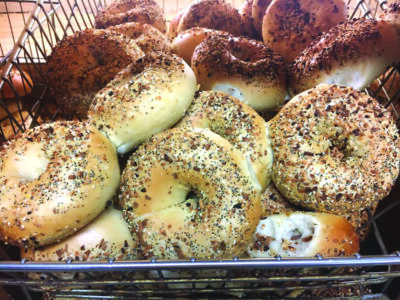
“If you go to the supermarket, there’s probably going to be two or three types in the seasoning aisle that call it an everything topping,” Weier said, “but generally speaking, you’re going to have garlic, onion, poppy, sometimes oat, sometimes sea salt. Generally it’s all the seeds that you would see on the various other bagels, just all combined onto one.”
What A Bagel, he said, will churn out anywhere from 18 different flavors of bagels to as many as 22 flavors on the weekend, from plain and everything to jalapeno cheddar, Asiago, cinnamon sugar, chocolate chip, maple cinnamon French toast and even a rainbow-colored bagel. Fleckner, meanwhile, said Bagel Alley will offer pumpkin-flavored bagels in the fall and green bagels for St. Patrick’s Day in addition to their regular lineup of around 16 flavors.
Asked about the different bagel flavors he can produce, Weygant said the total number is “immeasurable,” with endless possible combinations.
“There’s the ‘Big Seven,’ which is going to be plain, everything, sesame, poppy, onion, garlic and salt. Those are the core flavors that every bagel shop should have,” he said. “[But] I can do bespoke custom bagels for everybody that have more or less anything in them.”
Recently, for example, Weygant made a small, limited batch of Almond Joy bagels.
“It’s a traditional bagel dough, but what I did was I rolled ingredients into the dough by hand,” he said. “Basically it creates sort of like a tube on the inside of the dough, and it was filled with chocolate chips, sugar, coconut and pralined almonds.”
Schmears, eggs and lox
To many of us, a nice toasted bagel just isn’t in the cards without a spread of some cream cheese — or, if you prefer, a schmear.
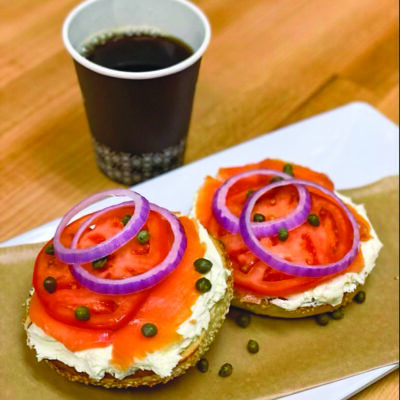
“When you get a bagel in Jersey or New York, it is loaded with cream cheese. I mean, it’s really front and center,” Bob Weygant of Rolleyholers in Exeter said. “Not everybody wants that much, and so we’ll size people up and give them the option on how much they want.”
Weygant said his shop will typically carry about seven or eight types of cream cheese at any given time, from plain, chive and veggie to other options like maple nut. He’ll make blueberry or strawberry cream cheese when those fruits are in season, and he’ll roast his own garlic for a fresh garlic and herb-flavored spread. He’s even done a sun-dried tomato and pesto cream cheese.
“Right now, I’m actually trying to figure out what the January, February, sort of late winter or mid-winter flavors are going to be,” he said. “I’m leaning toward things like banana, pineapple, vanilla [or] coconut. Just lighter flavors to play with.”
At What A Bagel in Nashua, owner Chris Weier said about eight variations of cream cheese are typically in stock at any given time, from plain and strawberry to cinnamon raisin walnut, bacon and scallion, chive and jalapeno. Bagel sandwiches are also a big deal at his shop — there’s a good selection of variations on the egg sandwich for breakfast, all of which are made to order.
Another traditional add-on to a bagel is known as lox — derived from the Yiddish word “laks,” according to Merriam-Webster Dictionary — or filleted pieces of brined, sometimes smoked, salmon. Weygant said you’ll most commonly also see lox accompanied by cream cheese, capers, red onions and thinly sliced tomatoes in a bagel sandwich.
“In my mind, the best bagel for lox is either a pumpernickel or rye, or a marble. That’s a traditional Jewish meal right there,” he said. “But as long as it’s savory, it will work well. I wouldn’t put it together with a sweet bagel of any kind.”
Bialys
Similar in size and shape to a bagel, a bialy is a traditional delicacy with Polish Jewish roots. But unlike bagels, bialys are simply baked, never boiled. An impression is made in the center of the dough, and will most often contain an onion and poppy seed mixture inside.

“It’s kind of like a cross between an English muffin and a bagel,” said Sheryl Tedford of Bagels From NH, a Northfield-based homestead business that also offers bialys. “You toast it like a bagel and eat it like a bagel, [with] cream cheese or butter or whatever you want to put on it.”
Bialys, she said, get their name from the Polish city of Bialystok, where they were first made.
“When you toast it, it’s actually a little crunchier, more like an English muffin. It’s crispier,” she said. “I do an overnight rise on that one, so it rises for 12 to 15 hours at a time, and it’s a much, much wetter dough, so it’s really sticky … and it’s baked quickly at a higher temperature.”
Bob Chertoff of The Bread Peddler, based in Sanbornton, grew up in a Jewish household outside of New York City, where bialys were commonplace. Today they’re a part of his regular lineup of products, which also includes various types of Eastern European breads. You can find him at Seacoast Eat Local’s winter farmers markets on Saturdays in Stratham and Rollinsford. During the spring and summer, he also participates in the Concord Farmers Market on Capitol Street.
“Traditional flavoring for a bialy is caramelized sweet onions mixed with poppy seeds,” Chertoff said. “[It’s] also made at times with garlic or other spices, but I only make the traditional.”
Where to get New Hampshire-made bagels
Here’s a list of local shops, restaurants and homestead businesses that make their own bagels from scratch. Did we miss any that aren’t on this list? Let us know at food@hippopress.com.
Agora Bagels
633-0286, Find them on Facebook @aggiesbagels
Paying homage to the traditional New York-style bagel, Agora Bagels is the project of Vassilios Palaskas of Milford, offering a variety of flavors of handcrafted artisan bagels, from plain, everything or cinnamon to French toast and Fruity Pebbles. Call or send a message through Facebook to place bagel orders for pickup on Friday, Jan. 27, at Murphy’s Diner (516 Elm St., Manchester). The cost is $13 per half-dozen and $25 per dozen. The diner will also be officially selling the bagels thereafter as a staple, Palaskas said.
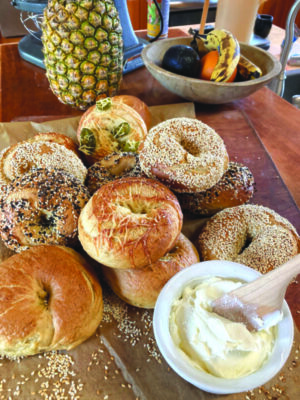
Almolu’s
2 Cooper Hill Road, Northwood, 608-1072, find them on Facebook @almolusbakery
Almolu’s opened in Northwood in May 2021, getting its name by combining the first names of owner Nat Ewing’s three daughters, Alice, Molly and Lucy. The shop is known for its hand-rolled bagels, of which Ewing said there are around 15 regular flavors in addition to some seasonal specials. Almolu’s also blends more than a half-dozen flavors of its own cream cheese.
Bagel Alley
1 Eldridge St., Nashua, 882-9343, find them on Facebook
A stone’s throw from Main Street in downtown Nashua, Bagel Alley has been owned and operated by the same family for more than three decades. Robert Frank and his stepson, Brett Fleckner of Westford, Mass., purchased the shop back in 1989. Bagel Alley makes all of its own bagels from scratch every day, featuring a lineup of about 16 flavors in addition to several kinds of cream cheese and a wide variety of bagel breakfast and lunch sandwiches. The shop also has several wholesale accounts across southern New Hampshire and northern Massachusetts.
Bagel Cafe
373 Hanover St., Manchester, 647-2233; 19 S. River Road, Bedford, 644-5555; 262 Amherst St., Suite A, Nashua (formerly Simit Cafe), 204-5141; bagelcafenh.com
In 1996 Ismail Kahya opened the first Bagel Cafe on Hanover Street in Manchester, which he continues to operate today. A second Bagel Cafe opened on Second Street in the Queen City in 2011 before moving to its current spot in Bedford two years later. In September 2021, Kahya’s son Remzi opened Simit Cafe on Amherst Street in Nashua (now also known as Bagel Cafe following a recent rebranding). All three locations are open seven days a week and produce their own hand-crafted bagels every day. Depending on which shop you visit, there’s usually 10 to 12 different flavors alongside a full menu of bagel breakfast sandwiches and several types of cream cheese.
The Bagel Mill Cafe & Bakery
145 Grove St. Ext., Peterborough, 924-0887, bagelmillnh.com
Since 1996 this Monadnock shop has been baking bagels and pastries fresh every morning. More than two dozen flavors are available, and with several toppings and spreads to choose from, the combinations are endless.

Bagels From NH
bagelsfromnh.com, find them on Facebook @bagelsfromnh
Sheryl Tedford of Northfield started Bagels From NH, what she called a “pandemic business,” in 2020 after retiring from her regular full-time job. She makes her own New York-style bagels in a variety of flavors, from everything and sesame to raisin and Asiago cheese, in addition to bialys, which she described as a cross between a bagel and an English muffin. Find her next at the Danbury Winter Market on Saturday, Feb. 4, from 9 a.m. to noon, at the Grange Hall (15 North Road, Danbury). During the summer months Tedford has participated in farmers markets in Canterbury, Gilmanton, Franklin and Wilmot.
Bagels Plus
2988 White Mountain Hwy., North Conway, 356-7400, bagels.plus
Located just a few minutes’ drive from the center of North Conway, this shop makes its own bagels fresh daily, featuring a lineup of nearly two dozen flavors in addition to various cream cheese and bagel sandwiches.
The Bakeshop on Kelley Street
171 Kelley St., Manchester, 624-3500, thebakeshoponkelleystreet.com
This West Side shop makes its own bagels in several flavors, from traditional options like plain and everything to Asiago, garlic onion and jalapeno cheddar. Bagels can also be ordered as breakfast and lunch sandwiches.
Big Dave’s Bagels & Deli
1130 Eastman Road, North Conway, 356-3283, bigdavesbagels.com
Before opening his shop in New Hampshire’s Mount Washington Valley in 2010, Dave Hausman learned how to make bagels in New York while working under Arthur Goldberg, whose sons have continued his legacy in several shops across the city’s metro area. In 1989 Hausman opened Monroe Bagels & Deli in Monroe, New York, which he operated for nearly two decades. Bagels at his North Conway shop are scratch-made with a variety of flavors to choose from.
Blue Loon Bakery
12 Lovering Lane, New London, 526-2892, blueloonbakery.com
This New London bakeshop opened in June 2018 in the site of a 19th-century barn and farmhouse. Bagels are hand-rolled from scratch and include flavors like plain, everything, sesame, Asiago and cinnamon raisin, and the option to add butter, cream cheese or peanut butter, as well as on several breakfast and lunch sandwiches.
Brown’s Bagel Shop
80 Main St., Newmarket, 292-5988, brownsbagelshop.com
Family-owned and -operated, Brown’s makes its own bagels from scratch daily, featuring a variety of flavors like plain, everything, pumpernickel, spinach, French toast and jalapeno cheddar, alongside several types of cream cheese and egg and bagel sandwiches.
Flight Coffee Co.
209 Route 101 West, Bedford, 836-6228, flightcoffeeco.com
Flight Coffee Co., which opened in its current space in June 2021, is known for making all its baked items from scratch daily, including its bagels, with flavors like plain, everything, Asiago and rosemary sea salt.
Loxsmith Bagel Co.
1B Wall St., Windham, 507-6105; 11 Main St., Dover, 507-6100; loxsmithbagelco.com
With two locations in New Hampshire and a third in Saco, Maine, Loxsmith Bagel Co. is known for making its own bagels fresh every day, featuring a variety of flavors in addition to specialty and build-your-own bagel options.
Rolleyholers
92 Portsmouth Ave., Suite 2, Exeter, 580-4460, rolleyholers.com
Rolleyholers, which opened in June 2021, is known for churning out hundreds of bagels a day, and you never know what flavor of dough or cream cheese spread owner Bob Weygant may think of next. There are classics like sesame, cinnamon raisin and everything, but also Asiago, blueberry and jalapeno cheddar. As for the spreads, Rolleyholers has dabbled in everything from plain, chive and veggie to pizza, sun-dried tomato and basil, and even a Dutch apple pie cream cheese.
What A Bagel
24 E. Hollis St., Nashua, 809-4466, what-a-bagel.com
Lifelong Nashua native and Marine Corps veteran Chris Weier took over this East Hollis Street shop in 2019. What A Bagel makes its own hand-rolled bagels from scratch daily, producing around 18 flavors during the week and upwards of about 22 flavors on the weekends. Nearly all of them, Weier said, are akin to a traditional New York-style, while a couple of flavors closely resemble Montreal-style bagels, which he said traditionally contain egg. What A Bagel is also known for its breakfast and lunch bagel sandwiches, which are always made to order.
Wicked Sweet Cakes and Treats
2370 Route 114, Bradford, 938-2663, wickedsweetcakesandtreats.com
Homemade bagels are baked fresh every Saturday morning at this Bradford shop, according to its website, and are available to order as is or on an egg sandwich.
Winnipesaukee Bay Gulls
118 Whittier Hwy., Moultonborough, 253-3177; 18 Weirs Road, Gilford, 527-8051; winnipesaukeebaygulls.com
Bagels here are baked continuously throughout the day. Flavors include everything from the classics — plain, poppy, sesame and everything — to others like cinnamon sugar, Parmesan and cracked wheat.
The Works Cafe
42 N. Main St., Concord, 226-1827, workscafe.com
Downtown Concord is just one of several Works Cafe locations you’ll find across New Hampshire (Keene, Durham and Portsmouth), Massachusetts (Amherst), Vermont (Brattleboro and Manchester), Maine (Portland) and New York state (Latham). Traditional New York-style bagels are boiled and baked in small batches daily and are available with a variety of flavored spreads or egg sandwiches to choose from.
Featured photo: A bagel sandwich from What A Bagel in Nashua. Courtesy photo.

